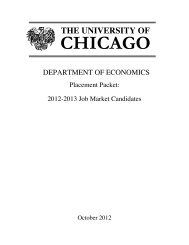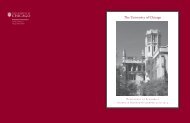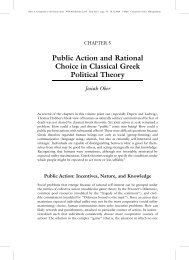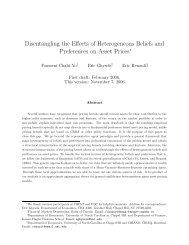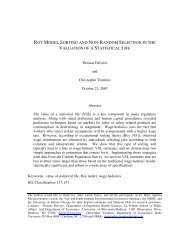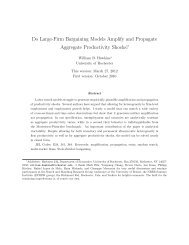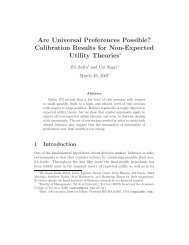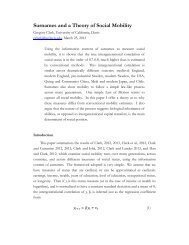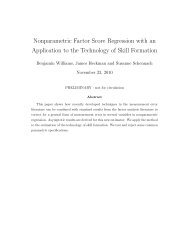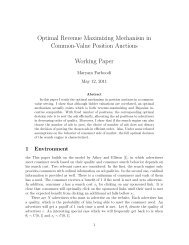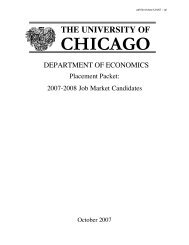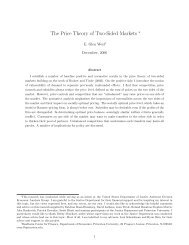CHICAGO - University of Chicago Department of Economics
CHICAGO - University of Chicago Department of Economics
CHICAGO - University of Chicago Department of Economics
You also want an ePaper? Increase the reach of your titles
YUMPU automatically turns print PDFs into web optimized ePapers that Google loves.
THE UNIVERSITY OF<br />
<strong>CHICAGO</strong><br />
DEPARTMENT OF ECONOMICS<br />
Placement Packet:<br />
2008-2009 Job Market Candidates<br />
October 2008<br />
(revised 12/05/08)
PRIMARY/SECONDARY FIELDS<br />
2008-2009<br />
Job Market Candidates<br />
by Field<br />
Applied Econometrics<br />
Applied Microeconomics / Price Theory<br />
Computational <strong>Economics</strong><br />
Contract Theory<br />
Corporate Finance<br />
Development<br />
Econometrics<br />
Economic History<br />
AKKUS, Oktay S S S P X X X<br />
BASU, Karna P P P X X X<br />
BRUZE, Gustaf S S P X X X<br />
DAMRAKS, Tanapoom S S S P P P X X X<br />
DECAROLIS, Francesco S P S S P S S X X X<br />
GARCIA-VERDU, Santiago S S P P X X X<br />
GETE, Pedro S S P P X X X<br />
GORRY, Aspen S S S P S X X X<br />
HONG, Sok Chul P P P P X X X<br />
KIM, Kun-Ho P P S S X X X<br />
MOON, Seong Hyeok P S S P X X X<br />
NAVA, Francesco S P P P S S X X X<br />
NISHIDA, Mitsukuni S S P P P S X X X<br />
OZDAGLI, Ali K. P S P X X<br />
RIVADENEYRA, Francisco S P X X<br />
WAGNER, Mathis P S S P S X X<br />
WANG, Yong P P P S P P S X X X<br />
Economic Theory / Mathematical Econ<br />
Environmental/ Natural Resource/ Urban <strong>Economics</strong><br />
Experimental <strong>Economics</strong><br />
Finance / Financial <strong>Economics</strong><br />
Growth<br />
Health <strong>Economics</strong><br />
Industrial Organization / Theory <strong>of</strong> the Firm<br />
International <strong>Economics</strong><br />
Labor / Human Capital<br />
Law & <strong>Economics</strong> / Political Economy<br />
Macroeconomics / Money & Banking<br />
Population <strong>Economics</strong> / Demography<br />
Public Finance / Public Sector<br />
Other<br />
Private Sector<br />
Public Sector<br />
Academic Sector<br />
revised 12/05/08 - jal<br />
Page 1
Oktay Akkus<br />
1215 E. Hyde Park Blvd. Apt. 410 akkus@uchicago.edu<br />
<strong>Chicago</strong>, IL 60615<br />
http://home.uchicago.edu/~akkus<br />
Cell: (773) 620-0455<br />
Education Ph.D. <strong>Economics</strong> <strong>University</strong> <strong>of</strong> <strong>Chicago</strong> (expected June 2009)<br />
M.A. <strong>Economics</strong> <strong>University</strong> <strong>of</strong> <strong>Chicago</strong> 2004<br />
M.A. <strong>Economics</strong> Sabanci <strong>University</strong>, Turkey 2002<br />
B.S. Industrial Engineering Marmara <strong>University</strong>, Turkey 2000<br />
Fields<br />
Primary: Industrial Organization<br />
Secondary: Corporate Finance, Applied Econometrics, Computational <strong>Economics</strong><br />
Job Market “Endogenous Matching and the Determinants <strong>of</strong> Underpricing in IPO Markets” 2008<br />
Paper Underpricing <strong>of</strong> initial public <strong>of</strong>ferings, defined by the first-day closing price being higher than the<br />
issue price, is a well-documented phenomenon that has been studied extensively in the finance<br />
literature. These prior studies have analyzed underpricing only through reduced form regressions<br />
on the observed characteristics <strong>of</strong> the issuer firms and the underwriters. Such an approach,<br />
however, yields biased estimates if some <strong>of</strong> the characteristics are not perfectly observed and there<br />
is endogenous matching between the issuers and the underwriters based on both the observed and<br />
unobserved characteristics. This paper solves the biased estimation problem by putting the IPO<br />
process into a two-sided matching framework, and using a novel econometric method to control<br />
for the endogenous matching. This methodological improvement brings computational ease and<br />
flexibility that allows the use <strong>of</strong> bank-specific fixed effects to analyze the preferences <strong>of</strong> match<br />
partners rigorously; which, in turn, enables the separation <strong>of</strong> the market equilibrium sorting effect<br />
and the direct influence <strong>of</strong> the match partners’ characteristics on underpricing. The analysis <strong>of</strong> the<br />
matching shows that underwriters’ total and industry-specific experiences are the most significant<br />
factors in issuer firms’ preferences, while the underwriters prefer bigger and venture-backed firms.<br />
According to the resulting decomposition, only two-thirds <strong>of</strong> the underwriter reputation effect,<br />
which is among the most emphasized determinants <strong>of</strong> underpricing in the literature, is accounted<br />
for by the direct influence.<br />
Secondary “Determinants <strong>of</strong> Bank Mergers: A Revealed Preference Analysis”, with Ali Hortacsu 2007<br />
Paper This paper analyzes bank mergers in a two-sided matching framework with endogenous transfers,<br />
where the two sides are formed by buyers and targets. When a buyer is matched with a target,<br />
there is a value created by this match. We impose a functional form for this value and estimate it<br />
by employing two maximum score estimators: one that uses transfer data, and one that does not.<br />
Our semi-parametric estimates show that the relative sizes <strong>of</strong> both assets and branches for each<br />
side <strong>of</strong> the match do matter. The closer these values for a matching pair are, the higher the value<br />
created. Secondly, geographical proximity, such as the buyer's and the target's branches being in<br />
the same markets or in neighboring markets, increases the value. Moreover, same market mergers<br />
obtain higher values than neighboring market mergers. Finally, at the time <strong>of</strong> the announcement <strong>of</strong><br />
the merger, mergers resulting in Antitrust violation <strong>of</strong> the post-merger local market concentration<br />
have lower values.<br />
Academic RA for Pr<strong>of</strong>. Ali Hortacsu<br />
Experience TA: Industrial Organization, Microeconomics, Game Theory, Public Finance 2005-2008<br />
Presentations Midwest Economic Association Conference, Minneapolis March 2007<br />
International Industrial Organization Conference, Savannah April 2007<br />
<strong>University</strong> <strong>of</strong> <strong>Chicago</strong>, Industrial Organization Seminar August 2006, November 2007<br />
November 2008 (scheduled)<br />
Referee<br />
International Journal <strong>of</strong> Industrial Organization<br />
Honors & Esther and T. W. Schultz Dissertation Fellowship 2007-2008<br />
Awards Social Sciences Division Fellowship 2002-2006<br />
Top-ranking graduate among all engineering students in Marmara <strong>University</strong> 2000<br />
References Ali Hortacsu (Chair) (773) 702-8250 hortacsu@uchicago.edu<br />
Jeremy Fox (773) 702-7587 fox@uchicago.edu<br />
Chad Syverson (773) 702-7815 chad.syverson@chicagogsb.edu
KARNA BASU<br />
<strong>Department</strong> <strong>of</strong> <strong>Economics</strong><br />
The <strong>University</strong> <strong>of</strong> <strong>Chicago</strong><br />
1126 E. 59th St.<br />
<strong>Chicago</strong>, IL 60637<br />
karna@uchicago.edu<br />
http://home.uchicago.edu/~karna<br />
(c) 1-617-642-4918 (w) 1-773-702-9014<br />
CURRENT EMPLOYMENT<br />
UNIVERSITY OF <strong>CHICAGO</strong>, <strong>Chicago</strong>, IL, USA<br />
Postdoctoral Fellow & Instructor, <strong>Department</strong> <strong>of</strong> <strong>Economics</strong>, 2006-2009<br />
EDUCATION<br />
MASSACHUSETTS INSTITUTE OF TECHNOLOGY, Cambridge, MA, USA<br />
Ph.D., <strong>Economics</strong>, 2006<br />
YALE UNIVERSITY, New Haven, CT, USA<br />
B.A., <strong>Economics</strong> and Mathematics, cum laude, 2000<br />
RESEARCH AND TEACHING AREAS<br />
Development <strong>Economics</strong>, Behavioral <strong>Economics</strong>, Applied Microeconomic Theory<br />
PAPERS (abstracts and full papers available on my website)<br />
• “Renegotiating with One’s Self”<br />
• “The Provision <strong>of</strong> Commitment in Informal Banking Markets: Implications for Takeup and<br />
Welfare”<br />
• “Hyperbolic Discounting and the Sustainability <strong>of</strong> Rotational Savings Arrangements” (under<br />
review)<br />
• “A Behavioral Model <strong>of</strong> Simultaneous Borrowing and Saving” (under review)<br />
• “Seasonality in Consumption: Evidence from a Field Experiment in Eastern Indonesia” (in<br />
progress, with Maisy Wong)<br />
• “Social Networks and Micr<strong>of</strong>inance” (in progress, with Abhijit Banerjee, Esther Duflo, and<br />
Matthew Jackson)<br />
TEACHING EXPERIENCE<br />
<strong>University</strong> <strong>of</strong> <strong>Chicago</strong>: Theoretical Models <strong>of</strong> Development (Graduate, joint with Roger Myerson)<br />
Intermediate Microeconomics (Undergraduate)<br />
Topics in Development and Economic Growth (Undergraduate)<br />
MIT:<br />
Introductory and Intermediate Microeconomics (Undergraduate)<br />
Applied <strong>Economics</strong> for Managers (Sloan School <strong>of</strong> Management, Tutor)<br />
Environmental Policy and <strong>Economics</strong> (Undergraduate, Teaching Assistant)<br />
HONORS, SCHOLARSHIPS, AND FELLOWSHIPS<br />
2006 – present: Short Term Consultant, The World Bank<br />
2008: NSF research grant (with Abhijit Banerjee, Esther Duflo, and Matthew Jackson)<br />
2007: Research grant from “Japanese Social Development Fund” (with Maisy Wong)<br />
Summer 2004: Selected Participant, Summer Institute in Behavioral <strong>Economics</strong>, Trento, Italy<br />
2000 – 2002: MIT <strong>Department</strong> <strong>of</strong> <strong>Economics</strong> Fellowship<br />
2000: Distinction in <strong>Economics</strong> and Mathematics, Yale <strong>University</strong><br />
REFERENCES<br />
Abhijit Banerjee Dept. <strong>of</strong> <strong>Economics</strong>, MIT banerjee@mit.edu 617-253-8855<br />
Xavier Gabaix Stern School <strong>of</strong> Business, NYU xgabaix@stern.nyu.edu 212-998-0257<br />
Roger Myerson Dept. <strong>of</strong> <strong>Economics</strong>, U. <strong>Chicago</strong> myerson@uchicago.edu 773-834-9071
GUSTAF BRUZE<br />
5330 S. Blackstone Avenue gustaf@uchicago.edu<br />
<strong>Chicago</strong>, IL 60615 Home phone: (773) 752 2578<br />
NATIONALITY<br />
Swedish<br />
EDUCATION Ph.D. <strong>Economics</strong> <strong>University</strong> <strong>of</strong> <strong>Chicago</strong> Expected June 2009<br />
B. Sc. Mathematics Stockholm <strong>University</strong> 2001<br />
M. Sc. <strong>Economics</strong> Stockholm School <strong>of</strong> <strong>Economics</strong> 2000<br />
FIELDS Primary: Labor / Human Capital<br />
Secondary: Growth, Development<br />
JOB MARKET<br />
PAPER<br />
“Schooling, Marriage, and Male and Female Consumption”<br />
A marriage matching model is estimated to quantify the share <strong>of</strong> returns to<br />
education that is realized through marriage. In the model, more educated agents<br />
earn higher wages in the labor market, and are more productive in housework.<br />
Men and women who marry benefit from the presence <strong>of</strong> household public goods,<br />
complementarities in household production, and the division <strong>of</strong> labor between<br />
spouses. The predictions <strong>of</strong> the model are matched with 1980 census data on<br />
sorting in marriage, and data on the allocation <strong>of</strong> time from a time use study.<br />
Counterfactual analysis for men and women, suggests that better marital<br />
outcomes generate 65 percent <strong>of</strong> the return to education for women around middle<br />
age and 20 percent <strong>of</strong> the corresponding return for men.<br />
OTHER PAPERS “What Causes Positive Sorting on Education in Marriage? Evidence from a Social<br />
Experiment”<br />
TEACHING TA, Undergraduate Macroeconomics Chad Syverson 2003<br />
EXPERIENCE TA, Undergraduate Microeconomics Omar Al-Ubaydli 2004<br />
TA, Undergraduate Microeconomics Vicor Lima 2006<br />
TA, American Economic History David Galenson 2004-07<br />
REFERENCES Casey Mulligan (joint chairman) (773) 702 9017 c-mulligan@uchicago.edu<br />
Ali Hortaçsu (joint chairman) (773) 702 5841 hortacsu@uchicago.edu<br />
Jeremy Fox<br />
(773) 702 4862 fox@uchicago.edu
TANAPOOM DAMRAKS<br />
5500 S Shore Dr Apt 1508, <strong>Chicago</strong>, IL 60637 Tel. (773) 733-1395<br />
tanapoom@uchicago.edu<br />
EDUCATION<br />
Ph.D. in <strong>Economics</strong> UNIVERSITY OF <strong>CHICAGO</strong> (expected) June 2009<br />
M.A. in <strong>Economics</strong> UNIVERSITY OF <strong>CHICAGO</strong> 2006<br />
M.S. in Computer Networks UNIVERSITY OF TOKYO, Japan 2004<br />
B.S. in Electrical Engineering, Summa Cum Laude CHULALONGKORN UNIVERSITY, Thailand 2001<br />
CFA Level III candidate<br />
FIELDS<br />
Primary: Finance/Asset Pricing, Industrial Organization, Macroeconomics<br />
Secondary: Computational <strong>Economics</strong>, Contract Theory<br />
PAPERS<br />
“Corporate Investment Structures in Dynamic Mechanism Design” (dissertation)<br />
This paper analyzes how an optimal business organizational structure can be formed. Using mechanism design and<br />
contract theory framework, I compare two types <strong>of</strong> organizations, hierarchical structure and distributional structure.<br />
Hierarchical structure benefits by mutual monitoring among agents, while distributional structure can avoid collusive<br />
strategies among agents. Optimal structure and contract are found by solving this model numerically with Matlab.<br />
“Bank Lending and Relative Performance” joint with Jose M. Liberti and Robert M. Townsend<br />
We study supply side <strong>of</strong> money lending business <strong>of</strong> a large international bank in Argentina. By disentangling the<br />
macroeconomic/industry-wide aggregate shock, we prove whether the bank makes decision about lending based on<br />
individual basis or by comparing performance <strong>of</strong> two firms. Both theoretical and empirical models are implemented.<br />
“Liquidity Premium in Fixed Income Securities”<br />
I constructed a measure <strong>of</strong> market-wide liquidity and utilized factor model to predict return <strong>of</strong> fixed income<br />
securities based on sensitivity <strong>of</strong> return to market-wide liquidity. Result suggests that liquidity is an important factor in<br />
pricing <strong>of</strong> fixed income securities.<br />
WORK EXPERIENCES<br />
• MERRILL LYNCH & CO., INC., New York, Associate, Global Fixed-Income & Equity-Linked Research 2008<br />
-Global Derivatives & Commodities Research: developed econometric model and analyzed fundamental market and<br />
macroeconomic data to predict petroleum product prices and volatility.<br />
-US Rates & Structured Credit Research: analyzed past delinquency and fundamental data to predict default rate in<br />
Mortgage-Backed Securities (MBS) and Asset-Backed Securities (ABS) market.<br />
-Credit Derivatives Research: developed model to improve pricing <strong>of</strong> CDX & iTraxx tranches. Solved problems <strong>of</strong><br />
Gaussian Copula model such as negative delta & high base correlation <strong>of</strong> senior tranches.<br />
• UNIVERSITY OF <strong>CHICAGO</strong>, Research Assistant for Pr<strong>of</strong>essor Robert M. Townsend 2005-2008<br />
-Developed financial models to predict the effect <strong>of</strong> Moral Hazard and Agency problems in financial markets. Simulated<br />
and solved models using MATLAB.<br />
• J.P. MORGAN SECURITIES, Tokyo, Japan, Associate, Quantitative Research/Trading 2007<br />
-Derivatives Research: developed and tested Tree/Finite Difference/Monte Carlo pricing models for new products in<br />
equity/rate exotics and hybrids.<br />
-Equity Derivatives Quantitative Strategy: designed and tested automated trading system and market timing strategies.<br />
Constructed trading strategies that outperform market index for 14% on average during the last 7 years.<br />
• UNIVERSITY OF TOKYO, Japan , Researcher, Advanced Information and Networking Lab 2001-2002<br />
-Developed algorithms for efficient data transfer. Constructed models using C language. Simulated data network models.<br />
• SIEMENS LTD., Bangkok, Thailand, Project Engineer 2000<br />
-Project Engineer <strong>of</strong> the Skytrain Project: designed and installed the fire alarm system <strong>of</strong> 3 stations.<br />
AWARDS AND HONORS<br />
-Henry Morgenthau Jr. Memorial Fund Dissertation Fellowship 2008-2009<br />
-<strong>University</strong> <strong>of</strong> <strong>Chicago</strong>, <strong>Department</strong> <strong>of</strong> <strong>Economics</strong> Scholarship (full tuition + stipend) 2004-2008<br />
-Best Paper Award, Institute <strong>of</strong> Electronics, Information and Communication Engineers (IEICE) 2003<br />
-Japanese Government Scholarship (full tuition + stipend) 2001-2003<br />
-Excellent Academic Record Awards (eight times consecutively), Chulalongkorn <strong>University</strong> 1997-2001<br />
OTHER PUBLICATION<br />
“Mobility Support for IEEE 802.11 Power Saving Terminal across Access Points Running TCP Proxy,” Institute <strong>of</strong><br />
Electronics, Information and Communication Engineers (IEICE), September 2003. Winner <strong>of</strong> the Best Paper Award.<br />
SELECTED SKILLS<br />
Languages : Fluent in Japanese and Thai.<br />
Computer : Simulation using MATLAB, VBA, STATA. Micros<strong>of</strong>t Word, Excel, PowerPoint. Basic knowledge <strong>of</strong> C.<br />
REFERENCES<br />
Robert M. Townsend (chair) MIT, <strong>Economics</strong> (617) 452-3722 rtownsen@mit.edu<br />
Roger B. Myerson <strong>University</strong> <strong>of</strong> <strong>Chicago</strong>, <strong>Economics</strong> (773) 702-6576 myerson@uchicago.edu<br />
Milton Harris <strong>University</strong> <strong>of</strong> <strong>Chicago</strong>, GSB (773) 702-2549 fmharris@chicagogsb.edu
FRANCESCO DECAROLIS<br />
5633 South Kenwood Ave. fdc@uchicago.edu<br />
<strong>Chicago</strong>, IL 60637<br />
http://home.uchicago.edu/~fdc<br />
Citizenship: Italy (F1 Visa) Tel. 773 - 6271075 / 6677455<br />
EDUCATION<br />
PhD in <strong>Economics</strong>, The <strong>University</strong> <strong>of</strong> <strong>Chicago</strong> Expected June 2009<br />
Thesis advisor: Pr<strong>of</strong>essor Ali Hortacsu. Thesis title: “Essays on Public Procurement”<br />
M.A. in <strong>Economics</strong>, The <strong>University</strong> <strong>of</strong> <strong>Chicago</strong> 2004<br />
B.A. in <strong>Economics</strong>, Università Bocconi (Italy) 2002<br />
Undergraduate thesis advisor: Pr<strong>of</strong>essor Guido Tabellini. Final grade <strong>of</strong> 110/110 summa cum laude<br />
RESEARCH AND TEACHING INTERESTS<br />
Industrial organization (Empirical and Theoretical), Economic Theory, Political Economy<br />
JOB MARKET PAPER: “When the Highest Bidder Loses the Auction: Theory and Evidence from Public Procurement”<br />
When bids do not represent binding commitments, the use <strong>of</strong> a first price sealed bid auction favours those bidders that are less<br />
penalized from reneging their bid. These bidders are the most likely to win but also to default on their bid. In this paper I analyze<br />
two methods <strong>of</strong>ten used in public procurement to deal with this problem: (1) augmenting the first price auction with an ex-post<br />
verification <strong>of</strong> the responsiveness <strong>of</strong> the bids and (2) using an average bid auction in which the winner is the bidder whose bid is<br />
the closest to the simple average <strong>of</strong> all the bids. The average bid auction is new to <strong>Economics</strong> but has been proposed by the Civil<br />
Engineering literature. I show that when bidders are asymmetric in their penalty for defaulting and their valuations have a<br />
predominant common component, the average bid auction is preferred over the standard first price by an auctioneer who bears a<br />
high enough cost due to the winner's insolvency. Depending on the cost <strong>of</strong> the ex-post verification, the average bid auction can be<br />
dominated by the augmented first price. I use a new dataset <strong>of</strong> Italian public procurement auctions, run alternately using a form <strong>of</strong><br />
the average bid auction or the augmented first price, to estimate semiparametrically the firms’ costs and use them to compute the<br />
firms’ mark up, the auctioneers’ implied verification cost and the inefficiency generated by the average bid auctions.<br />
WORKING PAPERS & RESEARCH IN PROGRESS<br />
“An Analysis <strong>of</strong> Collusion in Average Bid Auctions”<br />
(In progress)<br />
“The effects <strong>of</strong> the Emissions Trading Scheme on Electricity Price in Three European Countries”<br />
(In progress)<br />
“Homotopy Continuation Methods: An Algorithm for the Fixed Point and Newton Homotopy Methods with 2005<br />
Some Examples”. Joint with R. Mayer and M. Santamaria. Downloadable Code: http://home.uchicago.edu/~fdc/decarolis-research.htm<br />
PUBLICATIONS<br />
“Economic Effects <strong>of</strong> Democracy. An Empirical Analysis”. Rivista di Politica Economica, Dec, 2003, pp. 69 - 116.<br />
Winning paper: - Young Economist Award, European Economic Association<br />
- Angelo Costa Award, Rivista di Politica Economica (Best Italian BA thesis in <strong>Economics</strong>)<br />
FELLOWSHIPS & SCHOLARSHIPS<br />
Economic Research Fellowship, Bank <strong>of</strong> Italy 2008-2009<br />
Henry Morgenthau, Memorial Fund, <strong>University</strong> <strong>of</strong> <strong>Chicago</strong>, <strong>Economics</strong> Dept. Dissertation Fellowship 2007-2008<br />
<strong>University</strong> Unendowed Fellowship/Scholarship, <strong>University</strong> <strong>of</strong> <strong>Chicago</strong> 2003-2007<br />
Felice Gianani Scholarship, Associazione Bancaria Italiana 2005-2006<br />
Post-Graduate Scholarship, Univesità Bocconi 2003-2005<br />
TEACHING & REFEREE EXPERIENCE<br />
Competitive Strategy. (<strong>Chicago</strong> GSB) Teaching assistant for Pr<strong>of</strong>essor Marianne Bertrand 2007<br />
Game Theory and Economic Applications. (College) Teaching assistant for Pr<strong>of</strong>essor Roger Myerson 2006<br />
Referee for: International Journal <strong>of</strong> Industrial Organization, Rivista di Politica Economica<br />
PROFESSIONAL EXPERIENCE<br />
NERA Economic Consulting, Italy. Internship. 2007<br />
Italian Public Procurement Agency (Consip s.p.a), Italy. Internship. 2006<br />
Organisation for Economic Co-operation and Development (OECD), France. Trainee. 2003<br />
PRESENTATIONS<br />
CONFERENCES: Econometric Society Summer Meeting (2008), European Economic Association Annual Congress (2004,<br />
2008), International Industrial Organization Conference (2008), European Association for Research in Industrial <strong>Economics</strong><br />
(2008). WORKSHOPS (<strong>Chicago</strong>): Applications <strong>of</strong> <strong>Economics</strong>, IO Lunch Seminar, Economic Theory Working Group<br />
SKILLS<br />
Languages: Italian (Mother Tongue). English (Excellent). French (Good Knowledge). Spanish (Basic Knowledge)<br />
Computing: Windows; Micros<strong>of</strong>t Office; Internet; HTML; EViews; STATA; MATLAB; LaTeX; Ruby<br />
THESIS COMMITTEE<br />
Pr<strong>of</strong>. Ali Hortacsu (Chair) hortacsu@uchicago.edu 773-702-8250<br />
Pr<strong>of</strong>. Roger B. Myerson myerson@uchicago.edu 773-702-6576<br />
Pr<strong>of</strong>. Philip J. Reny preny@uchicago.edu 773-702-2417<br />
Pr<strong>of</strong>. Timothy G. Conley tim.conley@chicagogsb.edu 773-702-7281
Santiago Garcia-Verdu<br />
63 E Lake St Apt 802 <strong>Chicago</strong>, IL 60601<br />
Tel. (773) 684-0362 · E-mail: sgarciav@uchicago.edu<br />
http://home.uchicago.edu/~sgarciav/<br />
Education<br />
Fields<br />
Ph.D., <strong>Economics</strong>, <strong>University</strong> <strong>of</strong> <strong>Chicago</strong>, 2009 (expected)<br />
M.E., Financial Engineering, Princeton <strong>University</strong>, 2001<br />
M.A., <strong>Economics</strong> (highest honors), Instituto Tecnológico Autónomo de México (ITAM), 2000<br />
B.Sc., Applied Mathematics (honors), ITAM 1999<br />
Primary: Financial <strong>Economics</strong> and Monetary <strong>Economics</strong><br />
Secondary: Computational <strong>Economics</strong> and Econometrics<br />
Job Market Paper<br />
Equilibrium Yield Curves Under Regime Switching<br />
An unexpected increase in inflation affects yields in two ways. Directly, by decreasing the real component <strong>of</strong> the yields.<br />
Indirectly, by changing the yields as a risk-compensation to the extent it is a prelude <strong>of</strong> bad times. Thus, distinguishing<br />
between transient and long lasting changes in inflation and consumption growth is central to assess their effects on the<br />
yield curve. I develop, estimate and test a consumption-based asset pricing model to obtain yields under different<br />
specifications <strong>of</strong> a state-space model capturing consumption growth and inflation dynamics. To draw a distinction<br />
between the temporality <strong>of</strong> changes, I introduce unobservable components and regimes switching in the state-space<br />
model. Epstein-Zin preferences in turn capture the intertemporal distribution <strong>of</strong> risk. These two are key elements to<br />
introduce variability in the stochastic discount factor. I find that the implied yields with a coefficient <strong>of</strong> risk aversion<br />
between 5 to 30, depending on the exact specification, and a subjective discount factor <strong>of</strong> around 0.998 can capture<br />
central stylized facts including a consistent principal component decomposition and key features on yields' predictability.<br />
Work Experience Banco de México (Central Bank <strong>of</strong> Mexico), Visiting Economist, August 2008-September 2008<br />
Pemex, Deputy Manager, Mexico City, Mexico, July 2002-August 2003<br />
Algorithmics Incorporated, Associate Consultant, Mexico City, Mexico, August 2001-June 2002<br />
Academic Experience ITAM, Lecturer, M.Sc. in Finance, April 2003-June 2003<br />
Center for <strong>Economics</strong> Research (CIE), ITAM, Research and teaching assistant for Pr<strong>of</strong>essor<br />
Alejandro Hernandez Delgado, January 1999-June 2000<br />
Presentations<br />
Awards<br />
Working Papers<br />
Languages<br />
References<br />
Economic Dynamics Working Group, <strong>University</strong> <strong>of</strong> <strong>Chicago</strong> (2006-2008), Instituto<br />
Tecnológico Autónomo de México, (ITAM) (2008), Central Bank <strong>of</strong> Mexico (2008), The 3rd<br />
Mexican Energy Roundtable Business Meeting (2003), N.Y.<br />
Homer and Alice Hanson Jones Fellowship, <strong>University</strong> <strong>of</strong> <strong>Chicago</strong>, 2008-2009, Graduate<br />
Scholarship, Fulbright-Garcia-Robles, Comexus, 2003 –2006, Graduate Scholarship,<br />
CONACYT, Mexico, 2003 – 2008, Graduate Fellowship, Central Bank <strong>of</strong> Mexico, 2003 – 2008,<br />
CONSAR 3rd Best paper on Pension Fund Research, 2006<br />
Real returns and the inflation risk premium, Central Bank <strong>of</strong> Mexico, Working Paper<br />
Computational results for Cash-in-Advance Monetary Models<br />
Monetary Policy and the Term structure <strong>of</strong> interest rates: the case <strong>of</strong> Mexico<br />
Exogenous shocks to income and consumption-risk sharing<br />
Spanish (native), English (pr<strong>of</strong>icient), and basic French and Italian<br />
Pr<strong>of</strong>essor Lars P. Hansen, (chair), (773) 702-8170, l-hansen@uchicago.edu,<br />
<strong>Department</strong> <strong>of</strong> <strong>Economics</strong>, <strong>University</strong> <strong>of</strong> <strong>Chicago</strong><br />
Pr<strong>of</strong>essor Monika Piazzesi, (650) 723-9289, piazzesi@stanford.edu,<br />
<strong>Department</strong> <strong>of</strong> <strong>Economics</strong>, Stanford <strong>University</strong><br />
Pr<strong>of</strong>essor Fernando Alvarez, (773) 702-4412, f-alvarez1@uchicago.edu,<br />
<strong>Department</strong> <strong>of</strong> <strong>Economics</strong>, <strong>University</strong> <strong>of</strong> <strong>Chicago</strong>
5330 S. Blackstone Av. Apt.311<br />
<strong>Chicago</strong>, IL 60615<br />
773-273-0127<br />
PEDRO GETE<br />
pgete@uchicago.edu<br />
http://home.uchicago.edu/~pgete<br />
Education Ph.D. in <strong>Economics</strong> <strong>University</strong> <strong>of</strong> <strong>Chicago</strong> Expected June 2009<br />
M.A. in <strong>Economics</strong> <strong>University</strong> <strong>of</strong> <strong>Chicago</strong> June 2004<br />
J.D. Universidad Carlos III, Madrid, Spain June 2002<br />
B.A. in <strong>Economics</strong> Universidad Carlos III, Madrid, Spain June 2002<br />
Fields<br />
Job market<br />
paper<br />
Working paper<br />
Macroeconomics, International Finance, Monetary economics<br />
“Housing Markets and Current Account Dynamics”<br />
I model global imbalances as arising from changes in preferences for housing relative to tradable goods. The key<br />
ingredients in the model are labor reallocation across sectors and consumption smoothing between housing and<br />
tradable goods. Countries import goods during periods when more domestic labor is devoted to housing<br />
construction. Housing booms are larger and more persistent in countries that can run trade deficits. This occurs<br />
despite the absence <strong>of</strong> wealth effects, and even if trade is not primarily concentrated in capital goods. I provide<br />
several types <strong>of</strong> evidence to support the theory: First, over the last decade housing variables have decoupled from<br />
the business cycle while consumption and consumer durables have not. Second, for the same period there is a<br />
strong cross country correlation between housing variables and current account dynamics. Third, a parameterized<br />
version <strong>of</strong> the model generates cross section correlation between the labor share employed in construction (or<br />
value added from the construction sector) and the trade balance which is consistent with recent global imbalances.<br />
Fourth, I use sign restrictions implied by the model to estimate a vector autoregression and identify the effects <strong>of</strong><br />
housing specific shocks on the U.S. trade deficit. The results imply that housing shocks are an important driving<br />
force <strong>of</strong> current account dynamics.<br />
“Savings, Investment and Endogenous Fertility under Uncertainty” (work in progress)<br />
Presentations Macro/International Workshop, <strong>University</strong> <strong>of</strong> <strong>Chicago</strong>-GSB. October 2008<br />
Board <strong>of</strong> Governors <strong>of</strong> the Federal Reserve. Washington D.C. July 2008<br />
Economic Dynamics, Capital Theory Working groups, The <strong>University</strong> <strong>of</strong> <strong>Chicago</strong>. 2006, 2007, 2008<br />
Research<br />
experience<br />
Teaching<br />
experience<br />
Dissertation Internship. Board <strong>of</strong> Governors <strong>of</strong> the Federal Reserve. Summer 2008<br />
Internship. Bank <strong>of</strong> Spain. Madrid, Spain. Summer 2006<br />
Research Assistant for Anil Kashyap, The <strong>University</strong> <strong>of</strong> <strong>Chicago</strong>. 2006, 2007 and 2008<br />
Research Assistant for Monika Piazzesi, The <strong>University</strong> <strong>of</strong> <strong>Chicago</strong>. 2005 and 2006<br />
MBA courses at <strong>University</strong> <strong>of</strong> <strong>Chicago</strong> Graduate School <strong>of</strong> Business:<br />
Understanding Central Banking (Assistant for Anil Kashyap). Spring 2006 and 2008, Fall 2007<br />
Macroeconomics (Assistant for Veronica Guerrieri). Winter 2008<br />
College Courses at Universidad Carlos III de Madrid, Spain:<br />
Macroeconomics I and II (Assistant for Silvio Rendon and Juan Ruiz). 2002- 2003<br />
Microeconomics (Assistant for Pedro Albarran). 2002- 2003<br />
Awards Harper Dissertation Fellowship. Social Sciences Division. <strong>University</strong> <strong>of</strong> <strong>Chicago</strong>. 2008-09<br />
Margaret Reid Dissertation Fellowship. <strong>Department</strong> <strong>of</strong> <strong>Economics</strong>. <strong>University</strong> <strong>of</strong> <strong>Chicago</strong>. 2007-08<br />
NBER Summer Institute Monetary <strong>Economics</strong>, invited graduate student (Doolittle grant). 2007<br />
Bank <strong>of</strong> Spain Fellowship. 2005-2007<br />
La Caixa Foundation Fellowship. 2003-2005<br />
Middlebury College French School Fellowship. Summer 1999<br />
Languages and<br />
Computer skills<br />
Spanish (native language), English and French (fluent)<br />
AMPL, Dynare, E-Views, Matlab, Stata<br />
References Anil Kashyap (Co-chair), <strong>University</strong> <strong>of</strong> <strong>Chicago</strong>-GSB 773 702 1235<br />
Monika Piazzesi (Co-chair), Stanford <strong>University</strong> 650 723 9289<br />
Samuel Kortum, <strong>University</strong> <strong>of</strong> <strong>Chicago</strong> 773 702 8251<br />
anil.kashyap@chicagogsb.edu<br />
piazzesi@stanford.edu<br />
kortum@uchicago.edu
Aspen Gorry<br />
1530 East 59 th Street • <strong>Chicago</strong>, IL 60637<br />
aspen@uchicago.edu • http://home.uchicago.edu/~aspen • Phone: (602) 885-8856<br />
EDUCATION Ph.D. <strong>Economics</strong>, <strong>University</strong> <strong>of</strong> <strong>Chicago</strong> (Expected) 2009<br />
M.A. <strong>Economics</strong>, <strong>University</strong> <strong>of</strong> <strong>Chicago</strong> 2006<br />
B.S. <strong>Economics</strong> and B.S. Mathematics, Arizona State <strong>University</strong>, Summa Cum Laude 2004<br />
FIELDS<br />
Primary: Macroeconomics / Money and Banking<br />
Secondary: Economic Growth, International Trade, Public Finance, Labor / Human Capital<br />
JOB MARKET “Experience and Labor Market Flows” 2008<br />
PAPER<br />
This paper presents a model <strong>of</strong> learning where labor market experience provides information<br />
about the quality <strong>of</strong> future job matches. While previous models <strong>of</strong> learning focus on the effects<br />
<strong>of</strong> workers' productivity while employed, learning is also important to understand workers'<br />
search behavior while unemployed. When past experience provides a signal about job quality,<br />
the model can explain the decline in both job finding and separation rates found in the data.<br />
Models without learning cannot account for any decline in finding rates. Beyond accounting<br />
for labor market flows, the model gives predictions that are consistent with observed empirical<br />
wage distributions. Finally, I evaluate the effects <strong>of</strong> minimum wages on labor outcomes and<br />
find that the endogenous decline in job finding rates is essential to understand high<br />
unemployment rates for young workers subjected to minimum wages.<br />
WORKING “Labor Market Connections, Minimum Wages, and Youth Employment” 2008<br />
PAPERS “Optimal Taxation over the Life Cycle” (with Ezra Oberfield) 2008<br />
TEACHING Teaching Assistant, Theory <strong>of</strong> Income III (graduate), Robert Shimer, <strong>University</strong> <strong>of</strong> <strong>Chicago</strong> 2007<br />
EXPERIENCE Teaching Assistant, Theory <strong>of</strong> Income II (graduate), Thomas Sargent, <strong>University</strong> <strong>of</strong> <strong>Chicago</strong> 2007<br />
Teaching Assistant, Theory <strong>of</strong> Income I (graduate), Fernando Alvarez, <strong>University</strong> <strong>of</strong> <strong>Chicago</strong> 2006<br />
Teaching Assistant, Theory <strong>of</strong> Income III (graduate), Robert Shimer, <strong>University</strong> <strong>of</strong> <strong>Chicago</strong> 2006<br />
Teaching Assistant, Theory <strong>of</strong> Income II (graduate), Nancy Stokey, <strong>University</strong> <strong>of</strong> <strong>Chicago</strong> 2006<br />
Supplemental Instruction Leader (undergraduate), Macroeconomics, Arizona State <strong>University</strong> 2002<br />
Teaching Assistant, Various Courses (undergraduate), Arizona State <strong>University</strong> 2001-2003<br />
RESEARCH Research Assistant, Marco Bassetto, Federal Reserve Bank <strong>of</strong> <strong>Chicago</strong> and NBER 2007-2008<br />
EXPERIENCE Research Assistant, Robert Shimer, <strong>University</strong> <strong>of</strong> <strong>Chicago</strong> 2004-2005<br />
Research Assistant, Richard Rogerson, Arizona State <strong>University</strong> 2003-2004<br />
PRESENTATIONS Society for Economic Dynamics Annual Meeting, Cambridge, MA 2008<br />
North American Summer Meeting <strong>of</strong> the Econometric Society, Carnegie Mellon <strong>University</strong> 2008<br />
Money and Banking Workshop, <strong>University</strong> <strong>of</strong> <strong>Chicago</strong> 2008<br />
Capital Theory Working Group, <strong>University</strong> <strong>of</strong> <strong>Chicago</strong> 2007 & 2008<br />
AWARDS & Esther and T.W. Schultz Endowment Fund Dissertation Fellowship, <strong>University</strong> <strong>of</strong> <strong>Chicago</strong> 2008-2009<br />
FELLOWSHIPS Martin and Margaret Lee Prize in <strong>Economics</strong>, Price Theory Core Exam, <strong>University</strong> <strong>of</strong> <strong>Chicago</strong> 2005<br />
Martin and Margaret Lee Prize in <strong>Economics</strong>, Macro Core Exam, <strong>University</strong> <strong>of</strong> <strong>Chicago</strong> 2005<br />
National Science Foundation Graduate Research Fellowship 2004-2007<br />
Century Fellowship, <strong>Department</strong> <strong>of</strong> <strong>Economics</strong>, <strong>University</strong> <strong>of</strong> <strong>Chicago</strong> 2004-2008<br />
Omicron Delta Epsilon Award, Outstanding Graduating <strong>Economics</strong> Major, Arizona State <strong>University</strong> 2004<br />
Phi Beta Kappa 2004<br />
Rondthaler Prize for Outstanding Junior Major in <strong>Economics</strong>, Arizona State <strong>University</strong> 2002<br />
REFEREE<br />
Journal <strong>of</strong> Political Economy<br />
REFERENCES Robert Shimer (Chair) (773) 702-9015 shimer@uchicago.edu<br />
Fernando Alvarez (773) 702-4412 f-alvarez1@uchicago.edu<br />
Derek Neal (773) 702-8166 d-neal@uchicago.edu<br />
Nancy Stokey (773) 702-0915 nstokey@uchicago.edu
Center for Population <strong>Economics</strong><br />
<strong>University</strong> <strong>of</strong> <strong>Chicago</strong> Graduate School <strong>of</strong> Business<br />
5807 South Woodlawn Avenue<br />
<strong>Chicago</strong>, IL 60637<br />
SOK CHUL HONG<br />
Phone: 773-470-6445<br />
Fax: 773-702-2901<br />
E-mail: hongs@uchicago.edu<br />
Webpage: home.uchicago.edu/~hongs<br />
CURRENT<br />
POSITION AND<br />
AFFILIATIONS<br />
EDUCATION<br />
RESEARCH<br />
INTERESTS<br />
BOOK<br />
AND<br />
PAPERS<br />
TEACHING<br />
EXPERIENCES,<br />
RESEARCH,<br />
AND GRANTS<br />
Senior Research Associate, Center for Population <strong>Economics</strong>, <strong>University</strong> <strong>of</strong> <strong>Chicago</strong>, July 2007-present<br />
Affiliated Research Associate, Center on Demography and <strong>Economics</strong> <strong>of</strong> Aging, NORC, 2008-present<br />
<strong>University</strong> <strong>of</strong> <strong>Chicago</strong><br />
Ph.D. in <strong>Economics</strong>, June 2007<br />
Dissertation: The Health and Economic Burdens <strong>of</strong> Malaria: The American Case<br />
Seoul National <strong>University</strong><br />
M.A. in <strong>Economics</strong>, 2002 / B.A. in <strong>Economics</strong>, 2000<br />
Health <strong>Economics</strong>, Economic History, Economic Development<br />
• Economic evaluation <strong>of</strong> health care, and changes in the demand and supply <strong>of</strong> health care<br />
• Evaluation <strong>of</strong> the significance <strong>of</strong> the environment in human capital accumulation over the life cycle<br />
• Long-term trends in nutritional status, public health intervention, and economic productivity<br />
• Impact <strong>of</strong> disease on economic development<br />
• The Changing Body: Health, Nutrition, and Human Development in the Western World since 1700.<br />
Cambridge: Cambridge <strong>University</strong> Press. Forthcoming. (with Robert Fogel, Roderick Floud, and Bernard<br />
Harris)<br />
• The Burden <strong>of</strong> Early Exposure to Malaria in the United States, 1850-1860: Malnutrition and Immune<br />
Disorders. The Journal <strong>of</strong> Economic History 67(4): 1001-35. 2007<br />
• Malaria and Economic Productivity: The American Case.<br />
Revise-and-resubmit, Journal <strong>of</strong> Human Capital<br />
• Survival in 19th Century Cities: The Larger the City, the Smaller Your Chances. (with Louis Cain)<br />
Under review, Explorations in Economic History<br />
• Can Technology and Income Reduce the Burden <strong>of</strong> Obesity? (Working paper)<br />
• Climate and Historical U.S. Farm Productivity: Relation to the Changing Disease Environment<br />
(with Hoyt Bleakley, Working paper)<br />
• Malaria: An Early Indicator <strong>of</strong> Later Disease (Working paper)<br />
• Lecturer, Loyola <strong>University</strong> <strong>Chicago</strong>: Principles <strong>of</strong> Microeconomics, Spring 2008<br />
(Course Evaluation: 4.53 out <strong>of</strong> 5.0)<br />
• Research Assistant to Robert Fogel (2004-2007) and Hoyt Bleakley (2006-2007), <strong>University</strong> <strong>of</strong> <strong>Chicago</strong><br />
• Senior Research Associate, Early Indicators <strong>of</strong> Later Work Levels, Disease and Death<br />
(NIH/NIA P01 AG10120, Robert Fogel, Principal Investigator), 2007-present<br />
CONFERENCE<br />
AND SEMINAR<br />
PRESENTATIONS<br />
2008: NBER Cohort Studies Group, NBER Universities’ Research Conference, <strong>University</strong> <strong>of</strong> <strong>Chicago</strong>,<br />
Canadian Network for Economic History, Northwestern <strong>University</strong>, World Cliometrics, Illinois <strong>Economics</strong><br />
Association Meetings<br />
2007: Northwestern <strong>University</strong>, <strong>University</strong> <strong>of</strong> <strong>Chicago</strong>, Michigan State <strong>University</strong>, Economic History<br />
Association Meeting, Illinois Economic Association Meetings, Social Science History Association Meetings<br />
2006: <strong>University</strong> <strong>of</strong> <strong>Chicago</strong>, Economic History Association Meetings<br />
2005: Seoul National <strong>University</strong>, <strong>University</strong> <strong>of</strong> <strong>Chicago</strong><br />
CONFERENCES<br />
ATTENDED<br />
Lindau Nobel Laureates Meetings (2006, 2008), U.S. Cliometrics Conference (2007), Conference on the<br />
Economic Causes and Consequences <strong>of</strong> Population Aging (2006), RAND Summer Institute (2006)<br />
REFERENCES<br />
Robert Fogel<br />
Gary Becker<br />
Hoyt Bleakley<br />
Louis Cain<br />
Mine Cinar<br />
(773) 702-7709<br />
(773) 702-8191<br />
(773) 834-2192<br />
(847) 491-8225<br />
(312) 915-6066<br />
rwf@cpe.uchicago.edu<br />
gbecker@uchicago.edu<br />
bleakley@chicagogsb.edu<br />
lcain@northwestern.edu<br />
mcinar@luc.edu
Kun-Ho Kim<br />
1401 E. Hyde Park Blvd. Tel:773-493-2501<br />
Apt 202<br />
kunhokim@uchicago.edu<br />
<strong>Chicago</strong>, IL 60615<br />
http://home.uchicago.edu/˜ kunhokim<br />
Education<br />
The <strong>University</strong> <strong>of</strong> <strong>Chicago</strong>: PhD in <strong>Economics</strong> June 2009<br />
The <strong>University</strong> <strong>of</strong> <strong>Chicago</strong>: MS in Statistics June 2008<br />
The <strong>University</strong> <strong>of</strong> Wisconsin-Madison: May 2002<br />
BA in <strong>Economics</strong> and Mathematics (Graduation with Distinction)<br />
Sung Kyun Kwan <strong>University</strong>: BS in Electronic Engineering August 1995<br />
Fields <strong>of</strong> Interest<br />
Primary: Time Series Econometrics<br />
Secondary: Empirical Asset Pricing, Applied Macroeconomics<br />
Job Market Paper: Time-varying Risk Aversion<br />
We test the constancy <strong>of</strong> risk aversion. Based on the Epstein-Zin-Weil (Epstein & Zin, 1989, 1991;<br />
Weil, 1990) recursive utility, we derive the Euler equation with time-varying risk aversion (TV-RA)<br />
parameter. We utilize the proxy variable method to replace the unobserved return to aggregate wealth<br />
in the Euler equation. The estimation <strong>of</strong> the preference parameter is carried out based on the two-stage<br />
local linear regression method. Given the estimates, we employ the wild bootstrap procedures to test<br />
the constancy <strong>of</strong> the risk aversion parameter. The empirical findings strongly support the time variation<br />
in the parameter under the proxy variable approach.<br />
Working Papers<br />
Density Estimation for Nonlinear Time Series (with W.B. Wu)<br />
Improvement in Prediction through Disaggregation<br />
Non-stationary Structural Model with Time-varying Elasticities (with W.B. Wu and Z. Zhou)<br />
Semiparametric Estimation <strong>of</strong> the Marginal Density for the ARCH Process<br />
Another Look at Macroeconomic Forecasting<br />
Wavelet Analysis <strong>of</strong> the Dynamic Phillips Curve<br />
Deconvolution-type Estimation <strong>of</strong> Regression Function under Measurement Error<br />
Teaching Experience (TA)<br />
The <strong>University</strong> <strong>of</strong> <strong>Chicago</strong>:<br />
Statistical Theory/Method-2: Winter 2006, A Course for MS students in Statistics<br />
Statistical Methods and Applications: Spring 2006/Spring 2007, A Course for Undergraduate students<br />
Statistical Theory/Method-1: Autumn 2006/Winter 2007, A Course for MS students in Statistics<br />
Honors and Awards<br />
The <strong>University</strong> <strong>of</strong> <strong>Chicago</strong>:<br />
The <strong>University</strong> Fellowship, 2002-2006: (Tuition waivers and Stipends)<br />
The <strong>University</strong> <strong>of</strong> Wisconsin-Madison:<br />
Phi Beta Kappa, 2001<br />
Anna M. Ely Undergraduate Awards, 2001: Best Undergraduate Research paper in International Trade&Finance<br />
Listed on Dean’s List 7 times, 1997-2001<br />
Computer Skills and Languages<br />
R, Stata, Matlab, Minitab, and Fortran<br />
Korean(native), English(fluent), German(basic)<br />
References<br />
Pr<strong>of</strong>essor Robert McCulloch: Graduate School <strong>of</strong> Business, (708)707-7174, robert.mcculloch1@gmail.com<br />
Pr<strong>of</strong>essor Susanne Schennach: <strong>Department</strong> <strong>of</strong> <strong>Economics</strong>, (773)702-6576, smschenn@uchicago.edu<br />
Pr<strong>of</strong>essor Harald Uhlig: <strong>Department</strong> <strong>of</strong> <strong>Economics</strong>, (773)702-3702, huhlig@uchicago.edu<br />
Pr<strong>of</strong>essor Arnold Zellner: Graduate School <strong>of</strong> Business, (773)702-7145, arnold.zellner@chicagogsb.edu
Seong Hyeok Moon<br />
1155 E. 60th St. Suite 225 moon@uchicago.edu<br />
<strong>Chicago</strong>, Illinois 60637<br />
http://home.uchicago.edu/~moon<br />
Office: (773) 702 4686 / Cellular: (773) 241 4692<br />
EDUCATION Ph.D. <strong>Economics</strong> <strong>University</strong> <strong>of</strong> <strong>Chicago</strong> Expected, June 2009<br />
M.A. <strong>Economics</strong> <strong>University</strong> <strong>of</strong> <strong>Chicago</strong> June 2004<br />
M.A. <strong>Economics</strong> Seoul National <strong>University</strong> August 2001<br />
B.A. History Seoul National <strong>University</strong> February 1999<br />
FIELDS Primary: Labor <strong>Economics</strong>, Applied Econometrics<br />
Secondary: Applied Microeconomics, Development <strong>Economics</strong><br />
JOB MARKET<br />
PAPER<br />
“Multi-dimensional Human Skill Formation with Multi-dimensional Parental Investment”<br />
“Parental Investment” has been proposed as a key determinant <strong>of</strong> human skill. Accounting for its multidimensional<br />
nature allows more nuanced understanding <strong>of</strong> the skill formation process. Human skill itself<br />
is also multi-dimensional. This paper provides a consolidated framework to analyze a multi-dimensional<br />
skill formation process with multi-dimensional parental investment. A dynamic factor model is<br />
employed as the main workhorse and empirical results from Children <strong>of</strong> the National Longitudinal<br />
Survey <strong>of</strong> Youth 1979 (C-NLSY79) are presented for various demographic groups. The results suggest<br />
that different kinds <strong>of</strong> parental investment contribute to the formation <strong>of</strong> different types <strong>of</strong> skill at<br />
different developmental stages. Implications for policy design and inter-generational transmission <strong>of</strong><br />
inequality also are discussed.<br />
OTHER PAPERS “The Rate <strong>of</strong> Return to the Perry Preschool Program,” (with J. Heckman, R. Pinto, and A. Yavitz), 2008,<br />
submitted.<br />
“Reanalysis <strong>of</strong> the Perry Preschool Program: Multiple-Hypothesis and Permutation Tests Applied to a<br />
Quasi-Randomized Experiment,” (with J. Heckman, P. Savelyev, R. Pinto, and A. Yavitz), 2008.<br />
“Sibling Interactions and Human Skill Formation,” 2007.<br />
“Reconsidering Black-White Skill Convergence,” 2006.<br />
“The Skill Wage Differential in Korea after 1980s: Effects <strong>of</strong> International Trade, Labor Supply and<br />
Demand,” 2001.<br />
RESEARCH & Research Assistant for<br />
TEACHING James J. Heckman, Economic Research Center at <strong>University</strong> <strong>of</strong> <strong>Chicago</strong> 2006-present<br />
EXPERIENCES Researcher for<br />
Korea Development Institute 2001-2002<br />
Korea Labor Institute 1999-2001<br />
Teaching Assistant for<br />
James J. Heckman, Empirical Labor <strong>Economics</strong>, <strong>University</strong> <strong>of</strong> <strong>Chicago</strong> Spring 2008<br />
James J. Heckman, Longitudinal Data Analysis, <strong>University</strong> <strong>of</strong> <strong>Chicago</strong> Winter 2008<br />
Min Sok Lee, Intermediate Microeconomics, <strong>University</strong> <strong>of</strong> <strong>Chicago</strong> 2005-2006<br />
Dae-Il Kim, Labor <strong>Economics</strong>, Seoul National <strong>University</strong> Fall 2000<br />
PRESENTATIONS Institute for Research on Poverty Summer Research Workshop, <strong>University</strong> <strong>of</strong><br />
Wisconsin, Madison, WI.<br />
Inaugural Conference on Non-cognitive Skills, Center for European Economic<br />
Research (ZEW), Mannheim, Germany.<br />
Workshop on Long-run Impact <strong>of</strong> Early Life Events, National Poverty Center, Ann<br />
Arbor, MI.<br />
National Conference <strong>of</strong> the Early Childhood Research Collaborative, Federal Reserve<br />
Bank <strong>of</strong> Minneapolis, Minneapolis, MN.<br />
June 2008<br />
May 2008<br />
December 2007<br />
December 2007<br />
FELLOWSHIPS <strong>University</strong> <strong>of</strong> <strong>Chicago</strong> Tuition Award 2005-2007<br />
REFERENCES James J. Heckman (Chair) jheckman@uchicago.edu 773-702-3478 <strong>University</strong> <strong>of</strong> <strong>Chicago</strong><br />
Flavio Cunha fcunha@sas.upenn.edu 215-898-5652 <strong>University</strong> <strong>of</strong> Pennsylvania<br />
Azeem Shaikh amshaikh@uchicago.edu 773-702-3621 <strong>University</strong> <strong>of</strong> <strong>Chicago</strong>
Francesco Nava<br />
franava@uchicago.edu<br />
5631 S. Kenwood Ave<br />
home.uchicago.edu/~franava <strong>Chicago</strong>, IL 60637<br />
Cell: 773-209-3671<br />
[US Green Card]<br />
EDUCATION PhD in <strong>Economics</strong>, <strong>University</strong> <strong>of</strong> <strong>Chicago</strong> Now<br />
MA in <strong>Economics</strong>, <strong>University</strong> <strong>of</strong> <strong>Chicago</strong> 2005<br />
Laurea in <strong>Economics</strong>, Università Bocconi, Milan, Italy 2002<br />
FIELDS<br />
Economic Theory, Contract Theory, Political Economy, IO, Money and Banking & Computational <strong>Economics</strong><br />
JOB MAKET Quantity Competition in Networked Markets: Outflow & Inflow Competition 2008<br />
PAPER This analysis investigates how economies in which trades can occur only amongst individuals that know each other<br />
operate. Two general equilibrium models <strong>of</strong> oligopolistic Cournot competition are discussed. In the first individuals<br />
choose outflows to neighbors and net-demands determine prices to clear each local markets. While in the second inflows<br />
are chosen and net-supplies clear each local market. Sufficient conditions for the existence <strong>of</strong> a pure strategy equilibrium<br />
in the flow competition models are provided. In such economies changes in flows, affect both inflow and outflow prices.<br />
Moreover price distortions do not disappear as the changes in flows vanish. Suppliers price discriminate across buyers<br />
connected to them, but compete in each local market. Flows and prices in the economy are characterized. Equilibrium<br />
retrade with positive markups occurs even if the economy is fully connected. But neighbors with different marginal rates<br />
<strong>of</strong> substitution do not necessarily trade. Adding trading relationship in such environments can reduce social welfare.<br />
Moreover increasing the set <strong>of</strong> trading partners <strong>of</strong> an individual may cause him to suffer a loss. Sufficient conditions on<br />
the connectedness <strong>of</strong> the network are provided for the networked economy to converge to a competitive outcome as it<br />
grows large. In this simple setup it is proven that resale must vanish for an economy to become competitive as it grows<br />
large, since the gross margin <strong>of</strong> retail never vanishes. Prices and flows <strong>of</strong> the limiting economy are fully characterized.<br />
SECONDARY Joint Commitment: Implementation without Public Randomization 2007<br />
PAPER This paper investigates how the ability to jointly rule out actions affects behavior in a game. If players can voluntarily<br />
sign contracts that commit them to jointly rule out some <strong>of</strong> their actions, mutually beneficial bargains can <strong>of</strong>ten be found.<br />
The set <strong>of</strong> allocations implemented if players have a single opportunity to sign contracts that deterministically rule out<br />
some actions is characterized. Because players are not allowed to sign random contracts, it may appear that such subset<br />
<strong>of</strong> contracts does not in general implement all efficient allocations. The analysis however shows that if players have<br />
sufficiently many opportunities in which to sign such deterministic contracts, any individually rational allocation is<br />
approximately implementable. Therefore the implementation <strong>of</strong> any efficient and individually rational allocation does<br />
not require any randomness in the mechanism used if players have several opportunities in which to reach an agreement.<br />
WORKING Strategic Voting in Quorum Rules with Information Disclosure: Theory & Evidence 2007<br />
PAPERS Games <strong>of</strong> Independent Commitment 2007<br />
When to Produce? Optimal Timing <strong>of</strong> Production for Durable Goods 2006<br />
Sequential Equilibria in Infinite Games 2004<br />
Public Finance and Tax Evasion: the Dynamic Effect <strong>of</strong> Public Expenditure on Evasion 2004<br />
TEACHING Auction Theory Lecturer BA 2008 & 2009<br />
EXPERIENCE Price Theory III TA PhD Myerson, Sonnenschein & Reny 2005 & 2007<br />
Price Theory TA MBA Topel 2006<br />
Price Theory II TA PhD Sonnenschein 2005<br />
Game Theory TA BA Sonnenschein 2004 & 2005<br />
SELECTED Workshop in Economic Theory, <strong>University</strong> <strong>of</strong> <strong>Chicago</strong> 2007 & 2008<br />
PRESENTATIONS Econometric Society European Summer Meeting, Università Bocconi 2008<br />
Econometric Society North American Summer Meeting, Carnegie Mellon 2008<br />
Working Group in Economic Theory, <strong>University</strong> <strong>of</strong> <strong>Chicago</strong> 2006 & 2007<br />
FELLOWSHIPS Henry Morgenthau Jr. Memorial Fund Dissertation Fellowship 2007<br />
Irwin Rosen Fellowship, <strong>University</strong> <strong>of</strong> <strong>Chicago</strong> 2006<br />
<strong>University</strong> <strong>of</strong> <strong>Chicago</strong> Scholarship 2005<br />
REFEREE Journal <strong>of</strong> Public <strong>Economics</strong> 2008<br />
LANGUAGES<br />
COMPUTER<br />
English (fluent), Italian (native), French (fluent), German (fluent), Spanish (fair)<br />
Matlab, Stata, Maple, SWP, WinEdt, Spss, LaTex, Office, Matematica (basic), Fortran (basic)<br />
REFERENCES Roger Myerson 773- 702-6576 myerson@uchicago.edu<br />
Hugo Sonnenschein 773- 834-5960 h-sonnenschein@uchicago.edu<br />
Balazs Szentes 773- 702- 9127 szentes@uchicago.edu<br />
Phil Reny 773- 702-8192 preny@uchicago.edu
MITSUKUNI NISHIDA<br />
5547 S. Blackstone Ave., Apt 204 nishida@uchicago.edu<br />
<strong>Chicago</strong>, IL 60637<br />
http://home.uchicago.edu/~nishida<br />
Cellular: 312-513-3077<br />
EDUCATION Ph.D. <strong>Economics</strong> <strong>University</strong> <strong>of</strong> <strong>Chicago</strong> Expected June 2008<br />
B.A. International Relations Kyoto <strong>University</strong> March 1999<br />
FIELDS Primary: Industrial Organization<br />
Secondary: Computational <strong>Economics</strong>, Econometrics<br />
JOB MARKET<br />
PAPER<br />
WORKING PAPERS<br />
“Estimating a Model <strong>of</strong> Strategic Store Network Choice with Policy Simulation”<br />
Competition among multi-store chains is common in the retail industry. This paper proposes a method<br />
for estimating a model <strong>of</strong> strategic store network choices by two chains. In contrast to previous studies, I<br />
allow chains to not only choose which markets to enter but also how many stores to open in each <strong>of</strong><br />
those markets. To deal with the huge number <strong>of</strong> possible network choices, I use lattice-theoretical<br />
results. I show that a chain's net trade-<strong>of</strong>f between costs and benefits from clustering their stores in a<br />
market can be either positive or negative while still ensuring the existence <strong>of</strong> an equilibrium, thereby<br />
providing a way to freely estimate this within-market effect from the data. By integrating the model with<br />
revenue data, I show that one is able to decompose the within-market effect into cost savings from<br />
economies <strong>of</strong> density and lost revenues from competition with one’s own stores. I apply the technique to<br />
a unique cross-sectional data set from the convenience store industry in Okinawa, Japan, to obtain cost<br />
and demand parameters. The estimates imply a strong business stealing effect among own stores. I then<br />
use the estimated structural model to perform two counterfactual analyses. First, I evaluate the impacts<br />
<strong>of</strong> a hypothetical merger <strong>of</strong> two chains. I find that post-merger total surplus is expected to decrease due<br />
to reduction in the number <strong>of</strong> stores and total sales. Second, I consider how significantly the zoning<br />
regulation introduced in Japan in 1968 affects store network choices. Eliminating the regulation would<br />
increase the number <strong>of</strong> stores, but the magnitude <strong>of</strong> the increase is limited.<br />
“Estimating Aggregate Productivity Growth with Plant Level Data when Markets Are Not Competitive,”<br />
joint with Amil Petrin<br />
“Why Does a First-Mover Get Benefits? Evidence from the Convenience Store Industry”<br />
RESEARCH & Research Assistant for Pr<strong>of</strong>. Amil Petrin at <strong>Chicago</strong> GSB 2005-2006<br />
TEACHING Teaching Assistant: Undergraduate Econometrics A (Pr<strong>of</strong>. Jeremy Fox) Winter 2008<br />
EXPERIENCE Microeconomics (Pr<strong>of</strong>. Sebastian Ludmer) Winter 2006<br />
GRANTS, FELLOW- NET Institute Research Grant (www.NETinst.org) 2008<br />
SHIPS & AWARDS Dissertation Fellowship, the Center <strong>of</strong> East Asian Studies, <strong>University</strong> <strong>of</strong> <strong>Chicago</strong> 2008-2009<br />
The Joint Japan/ World Bank Scholarship 2005-2007<br />
Endowed Scholarship, <strong>University</strong> <strong>of</strong> <strong>Chicago</strong> 2004-2005<br />
1 out <strong>of</strong> 122 in <strong>Economics</strong>, National Personnel Authority <strong>of</strong> Japan 1998<br />
CONFERENCE European Association for Research in Industrial <strong>Economics</strong> (EARIE), France 2008<br />
PRESENTATIONS Econometric Society Far Eastern and South Asian Meeting, Singapore 2008<br />
Midwest <strong>Economics</strong> Association Annual Meeting, <strong>Chicago</strong> 2008<br />
SEMINAR <strong>University</strong> <strong>of</strong> <strong>Chicago</strong> Industrial Organization seminar; micro lunch seminar 2008<br />
PRESENTATIONS Kyoto; Tokyo; Yokohama National; Hitotsubashi; Tsukuba; IDE-JETRO 2008<br />
EMPLOYMENT Overseas Researcher, National Personnel Authority <strong>of</strong> Japan 2002-2004<br />
Economist, Division for Economic Outlook, Cabinet Office, Japan 2001-2002<br />
Section Chief, Ministry <strong>of</strong> Economy, Trade and Industry, Japan 1999-2001<br />
REFEREE International Journal <strong>of</strong> Industrial Organization 2008<br />
REFERENCES Jeremy Fox (chair) <strong>University</strong> <strong>of</strong> <strong>Chicago</strong> 773-702-4862 fox@uchicago.edu<br />
Ali Hortacsu <strong>University</strong> <strong>of</strong> <strong>Chicago</strong> 773-702-5841 hortacsu@uchicago.edu<br />
Chad Syverson <strong>University</strong> <strong>of</strong> <strong>Chicago</strong>, GSB 773-702-7815 syverson@uchicago.edu<br />
Jean-Pierre Dubé <strong>University</strong> <strong>of</strong> <strong>Chicago</strong>, GSB 773-834-5377 jdube@chicagogsb.edu
ALI K. OZDAGLI<br />
5403 South Harper Ave. #1, <strong>Chicago</strong>, IL 60615<br />
+1 312 863 1127<br />
ozdagli@uchicago.edu<br />
http://home.uchicago.edu/~ozdagli<br />
EDUCATION Ph.D. in <strong>Economics</strong> <strong>University</strong> <strong>of</strong> <strong>Chicago</strong> June 2009 (expected)<br />
M.A. in <strong>Economics</strong> Humboldt <strong>University</strong> <strong>of</strong> Berlin July 2004<br />
B.S. in Industrial Engineering Bogazici <strong>University</strong> June 2002<br />
FIELDS<br />
JOB MARKET<br />
PAPER<br />
Primary: Macroeconomics, Financial <strong>Economics</strong><br />
Secondary: Labor/Human Capital<br />
Financial Leverage, Corporate Investment and Stock Returns<br />
Recent papers claim to explain the differences in returns <strong>of</strong> value and growth stocks using production<br />
based models. However, these papers ignore debt financing although the evidence they rely on (Fama and<br />
French, 1992, 1995, 1996) is for the levered firms. Moreover, they assume a very high degree <strong>of</strong> capital<br />
irreversibility to generate sufficient dispersion in cross-sectional distribution <strong>of</strong> stock returns. This paper<br />
presents a model with limited capital irreversibility and incomplete debt contracts in order to explain the<br />
differences <strong>of</strong> value and growth stocks. The capital structure affects stock returns directly through its<br />
effect on risk structure a la Modigliani and Miller (1958) and indirectly through its effect on investment<br />
decisions. The model also conforms to other empirical results about value and growth firms such as low<br />
dispersion in the book leverage, high dispersion in the market leverage and the limited response <strong>of</strong> U.S.<br />
corporations to counteract the influence <strong>of</strong> stock price changes on their capital structure.<br />
WORKING “College Enrollment, Dropouts and Option Value <strong>of</strong> Education”, 2008 (with Nicholas Trachter)<br />
PAPERS “Implications <strong>of</strong> Investment Adjustment Cost for Investment Behavior”, 2007<br />
TEACHING Lecturer, <strong>University</strong> <strong>of</strong> <strong>Chicago</strong><br />
EXPERIENCE Elements <strong>of</strong> <strong>Economics</strong> Analysis 4 (Undergraduate Macroeconomics II) Spring 2009<br />
Teaching Assistant, <strong>University</strong> <strong>of</strong> <strong>Chicago</strong><br />
Stochastic Economic Models <strong>of</strong> Macroeconomics (Ph.D. ECON/GSB) Lars Hansen, Winter 2008<br />
Harald Uhlig<br />
Elements <strong>of</strong> Economic Analysis 3 and 4 (Undergraduate) Peter Bondarenko Summer 2007<br />
Theory <strong>of</strong> Income II (Ph.D. ECON) Thomas Sargent Winter 2007<br />
Financial Instruments (MBA) Monika Piazzesi Winter 2007<br />
Macroeconomics (MBA) Christian Broda Summer 2006<br />
Theory <strong>of</strong> Income III (Ph.D. ECON) Robert Shimer Spring 2006<br />
Theory <strong>of</strong> Income II (Ph.D. ECON) Nancy Stokey Winter 2006<br />
RESEARCH Research Assistant, Fernando Alvarez, <strong>University</strong> <strong>of</strong> <strong>Chicago</strong> 2006-2007<br />
EXPERIENCE Research Assistant, Ali Hortacsu, <strong>University</strong> <strong>of</strong> <strong>Chicago</strong> 2006<br />
PRESENTATIONS Society for Economic Dynamics Annual Meeting, Cambridge, MA, 2008<br />
Wednesday Finance Lunch, <strong>University</strong> <strong>of</strong> <strong>Chicago</strong>, 2008<br />
Economic Dynamics Working Group, <strong>University</strong> <strong>of</strong> <strong>Chicago</strong>, 2006-2008<br />
Capital Theory Working Group, <strong>University</strong> <strong>of</strong> <strong>Chicago</strong>, 2006-2008<br />
Money and Banking Working Group, <strong>University</strong> <strong>of</strong> <strong>Chicago</strong>, 2008<br />
Option Values Working Group, <strong>University</strong> <strong>of</strong> <strong>Chicago</strong>, 2008<br />
AWARDS George J. Stigler Dissertation Fellowship, 2008-2009<br />
AND Institute for Humane Studies Fellowship, 2008-2009<br />
FELLOWSHIPS Provost’s Summer Research Fellowship, 2008<br />
Lee Prize in Capital Theory/Money and Banking Field Exam, 2006<br />
<strong>University</strong> <strong>of</strong> <strong>Chicago</strong> Unendowed Fellowship, 2004-2008<br />
Economic Society Award, Humboldt <strong>University</strong>, 2004<br />
REFEREE<br />
Review <strong>of</strong> Economic Dynamics<br />
REFERENCES Fernando Alvarez (co-chair) (773) 702-4412 f-alvarez1@uchicago.edu<br />
Lars P. Hansen (co-chair) (773) 702-8170 l-hansen@uchicago.edu<br />
Anil Kashyap (773) 702-7260 anil.kashyap@chicagogsb.edu<br />
Robert E. Lucas, Jr. (773) 702-8191 relucas@uchicago.edu<br />
OTHER Organizer <strong>of</strong> Economic Dynamics Working Group, 2006-2008
F R A N C I S C O R I V A D E N E Y R A<br />
63 E Lake St. Apt. 309 • <strong>Chicago</strong>, Il. • 60601 • USA<br />
+1 (773) 203 4525 • rivas@uchicago.edu<br />
EDUCATION<br />
The <strong>University</strong> <strong>of</strong> <strong>Chicago</strong>, <strong>Chicago</strong> Il.<br />
• Ph.D. in <strong>Economics</strong><br />
January 2009 (expected)<br />
• M.A. in <strong>Economics</strong> September 2004<br />
Instituto Tecnológico Autónomo de México (ITAM), Mexico City<br />
• B.A. in <strong>Economics</strong> January 2003<br />
RESEARCH FIELDS<br />
Monetary <strong>Economics</strong> (primary) and Asset Pricing (secondary).<br />
BANKING AND RESEARCH EXPERIENCE<br />
Deutsche Bank, New York, Summer Associate June - August 2007<br />
• Worked with the US <strong>Economics</strong> Team and Emerging Markets Strategy group.<br />
• Prepared with Chief Economist Peter Hopper the report to clients “The Secular Decrease in Long-Term<br />
Premia.” Explained recent development in long-term rates and forecasted future trends.<br />
• Implemented an affine model <strong>of</strong> interest rates for Mexico.<br />
ITAM, Mexico City, Visiting Researcher September 2005<br />
• Prepared and presented the paper “Tax Incidence in a Principal Agent Framework.”<br />
Banco de México, Mexico City, Summer Researcher July - August 2005<br />
• Wrote the paper “Affine Models <strong>of</strong> the Term Structure <strong>of</strong> Interest Rates in Mexico.”<br />
• Trained a team <strong>of</strong> 5 economists on continuous-time finance techniques and principal component analysis.<br />
Banco de México, Mexico City, Economist February 2001 - September 2003<br />
• Co-developed and managed the Bank’s macroeconometric forecasting model.<br />
• Produced with senior economists the Quarterly Inflation Report.<br />
• Researched and prepared with Chief Economist policy memos for the Board <strong>of</strong> Governors’<br />
monetary policy agenda. Topics included the optimal inflation level, the price index to target, and<br />
the design <strong>of</strong> calendar <strong>of</strong> meetings.<br />
PUBLICATIONS AND WORKING PAPERS<br />
“Real Risk Premia in Segmented Asset Markets”, working paper, September 2008.<br />
“Affine Models <strong>of</strong> the Term Structure <strong>of</strong> Interest Rates in Mexico”, working paper, October 2005.<br />
“The Law <strong>of</strong> One Price in Mexico: an Empirical Analysis” with M. Gonzalez. Gaceta de Economía, (19) 2005.<br />
“Trade Creation and Trade Deviation from Preferential Trade Agreements: New Estimations for NAFTA”<br />
with J. Chavez. Gaceta de Economía, (14) 2002.<br />
COMMUNICATION AND TEAM SKILLS<br />
<strong>University</strong> <strong>of</strong> <strong>Chicago</strong> GSB, Teaching Assistant (Macro and Microeconomics) January 2006 – present<br />
ITAM, Faculty Seminar Presentation September 2005<br />
Banco de México, Macroeconomics Seminar Presentations September 2005, January 2003, March 2002<br />
Gaceta de Economía (ITAM’s journal), Chief Editor August 2001 - July 2002<br />
• Coordinated referees and applied the editorial policies <strong>of</strong> the journal. Managed a 10-member staff.<br />
• Strengthened the journal’s editorial and financial position by implementing new operation manuals.<br />
ITAM, Teaching Assistant (Microeconomics) August 1999 - May 2001<br />
FELLOWSHIPS AND REFEREE WORK<br />
Banco de Mexico and National Council on Science and Technology Fellowships September 2003 – current<br />
Ministry <strong>of</strong> Education Excellency Fellowship August 1997 – July 2001<br />
Journal <strong>of</strong> Political Economy Referee<br />
September 2006– current<br />
COMPUTING AND LANGUAGES<br />
Computing: Matlab, Eviews, Stata, LaTeX and MS Office.<br />
Languages: Spanish (native), English (fluent), French (intermediate).<br />
REFERENCES<br />
Fernando Alvarez <strong>University</strong> <strong>of</strong> <strong>Chicago</strong> falvare@uchicago.edu<br />
Lars P. Hansen <strong>University</strong> <strong>of</strong> <strong>Chicago</strong> lhansen@uchicago.edu<br />
Monika Piazzesi Stanford <strong>University</strong> piazzesi@stanford.edu
5480 S Ridgewood Ct<br />
<strong>Chicago</strong>, IL 60615<br />
(773) 396 7897<br />
MATHIS WAGNER<br />
mwagner@uchicago.edu<br />
http://home.uchicago.edu/~mwagner<br />
EDUCATION Ph.D. in <strong>Economics</strong> <strong>University</strong> <strong>of</strong> <strong>Chicago</strong> (expected) June 2009<br />
M.A. in <strong>Economics</strong> <strong>University</strong> <strong>of</strong> <strong>Chicago</strong> December 2003<br />
B.A. in <strong>Economics</strong> Cambridge <strong>University</strong>, UK June 1999<br />
FIELDS Primary: Labor <strong>Economics</strong>, Applied Microeconomics / Price Theory<br />
Secondary: Experimental <strong>Economics</strong>, Industrial Organization, Public <strong>Economics</strong><br />
JOB MARKET<br />
PAPER<br />
WORKING<br />
PAPERS<br />
“Understanding the Labor Market Impact <strong>of</strong> Immigration”<br />
Using Austrian panel data I show that the effect <strong>of</strong> immigration on native wages and employment varies<br />
across industries (for example, on average it is positive in manufacturing and negative in services). By<br />
combining an IV approach with an explicit modeling <strong>of</strong> native labor decisions (thus dealing with both the<br />
endogeneity <strong>of</strong> immigrant and native labor flows) I am able to explain these findings in terms <strong>of</strong> scale and<br />
substitution effects and the elasticity <strong>of</strong> labor supply. Previous approaches are not able to identify scale<br />
effects and so can only estimate the impact <strong>of</strong> immigration on relative wages <strong>of</strong> groups <strong>of</strong> workers.<br />
Finally, I show that the data is consistent with a model <strong>of</strong> task specialization, which explains why lowskilled<br />
immigration can increase average wages even for low-skilled natives.<br />
“Pension Benefits and Retirement Decisions: Income versus Price Effects” (with D. Manoli)<br />
Using Austrian administrative data and multiple pension reforms between 1984 and 2003 we separately<br />
identify income and price effects from pension benefits on retirement. We find an elasticity <strong>of</strong> the<br />
retirement hazard with respect to benefits <strong>of</strong> 1.9, most <strong>of</strong> which (85%) is due to the price effect.<br />
“An Introduction to Optimal Sample Arrangements” (with J. List and S. Sad<strong>of</strong>f) submitted<br />
We provide simple rules <strong>of</strong> thumb that researchers can apply to improve the efficiency <strong>of</strong> their<br />
experimental designs. We buttress these points by including empirical examples from the literature.<br />
“Gender Differentials over the Lifecycle”<br />
Using panel data on cohorts <strong>of</strong> Austrians I decompose gender wage differences over the lifecycle. Lower<br />
wages in female occupations accounts for the initial gap (around 15%). Subsequent widening <strong>of</strong> the gap is<br />
primarily due to one-<strong>of</strong>f falls in wages after childbirth, differences in accumulation <strong>of</strong> experience and<br />
tenure account for the rest, whereas returns to experience and tenure are very similar across genders.<br />
TEACHING<br />
FELLOWSHIPS &<br />
AWARDS<br />
Lecturer, <strong>University</strong> <strong>of</strong> <strong>Chicago</strong><br />
Introduction to Labor <strong>Economics</strong> (undergraduate)<br />
Teaching Assistant, <strong>University</strong> <strong>of</strong> <strong>Chicago</strong><br />
Microeconomics (R. Topel, Graduate School <strong>of</strong> Business)<br />
Public Policy / Wage Inequality (D. Autor, undergraduate)<br />
Intro to Microeconomics, Intro to Macroeconomics (A.<br />
Sanderson), Intermediate Microeconomics (G. Tsiang)<br />
Esther and T.W Schultz Endowment Fellowship<br />
Sherwin Rosen Fellowship<br />
<strong>University</strong> <strong>of</strong> <strong>Chicago</strong> Fellowship<br />
2006, 2008<br />
2006, 2007, 2008<br />
2007<br />
2004-2006<br />
2006-2009<br />
2004-2006<br />
2003-2006<br />
SELECTED<br />
PRESENTATIONS<br />
REFEREE<br />
EMPLOYMENT<br />
<strong>University</strong> <strong>of</strong> <strong>Chicago</strong>: Applications Workshop (2006-08), Applied Microeconomics W.G.<br />
(2004-08); Federal Reserve Bank <strong>of</strong> <strong>Chicago</strong> (2007); <strong>University</strong> <strong>of</strong> Illinois at <strong>Chicago</strong> (2007)<br />
Journal <strong>of</strong> Political Economy<br />
Economist, HM Treasury, UK (September 1999 – June 2002): Productivity and Structural<br />
Reform Team, Fiscal and Macroeconomic Policy Team.<br />
REFERENCES<br />
Robert Topel (chair)<br />
Jonathan Guryan<br />
Steven Levitt<br />
John List<br />
(773) 702-7524<br />
(773) 834-5967<br />
(773) 834-1862<br />
(773) 702-6576<br />
robert.topel@chicagogsb.edu<br />
jonathan.guryan@chicagogsb.edu<br />
slevitt@uchicago.edu<br />
jlist@uchicago.edu
YONG WANG<br />
5433 South Cornell Ave, Apartment 1N, <strong>Chicago</strong>, IL 60615 wangyong@uchicago.edu<br />
Phone: (773) 401- 0382<br />
http://home.uchicago.edu/~wangyong<br />
EDUCATION Ph.D. <strong>Economics</strong>, <strong>University</strong> <strong>of</strong> <strong>Chicago</strong> Expected June 2009<br />
M.A. <strong>Economics</strong>, CCER, Peking <strong>University</strong>, China, highest distinction June 2003<br />
B.A. International <strong>Economics</strong>, Fudan <strong>University</strong>, China, Summa cum Laude June 2000<br />
FIELDS Primary: Political Economy, Growth and Development, Economic Theory<br />
Secondary: Public Finance and International <strong>Economics</strong><br />
JOB MARKET PAPER<br />
Fiscal Decentralization, Endogenous Policies and Technology Adoption: Theory and Evidence from China and India’s FDI<br />
[Abstract] A political economy model is developed to explain why two developing economies with the same economic fundamentals<br />
can have different de facto economic policies and hence receive dramatically different amount <strong>of</strong> FDI (foreign better technology). I<br />
show how fiscal decentralization can have a non-monotonic and dramatic impact on policies and FDI. Too much fiscal<br />
decentralization can hurt the central government's incentives hence it chooses the policy pr<strong>of</strong>iles to induce the local government to<br />
block FDI. Too little fiscal decentralization can render the local government captured by the protectionist special interest group. I also<br />
show how FDI may bifurcate because the local government’s preference for FDI can be endogenously polarized thus a small change<br />
in fiscal decentralization might radically shift the local government’s policy. The simulation/calibration results closely match China<br />
and India’s macro and policy data. Counterfactual experiments indicate that the degree <strong>of</strong> fiscal decentralization can well explain why<br />
these two economies at similar development stage have a nine-fold difference in FDI per capita.<br />
SELECTED<br />
PAPERS<br />
IN PROGRESS<br />
[1] Endogenous Social Infrastructure and Economic Development, Sept. 2007 (under review)<br />
(Illinois Economic Association Best PhD Student Paper Award, Illinois, 2007)<br />
[2] Institutional Barrier, Learning Externality and Catching Up, May 2007 (under review)<br />
[3] Factor Endowment, Specialization and Trade: Theory and Empirics,<br />
with Jiandong Ju and Justin Yifu Lin, China Economic Quarterly, No.1, 2005 (in Chinese)<br />
[4] Endogenous Coalition, Economic Growth and Inequality, World Economic Papers, No.2, 2004 (in Chinese)<br />
Over six published Chinese papers and three translated books including Fudenberg and Tirole’s Game Theory<br />
[1] Endowment Structure and Optimal Industrial Upgrading, with Justin Yifu Lin and Jiandong Ju<br />
[2] Revisiting Uniqueness <strong>of</strong> Global-Game Equilibrium with Market Prices, with Balazs Szentes<br />
[3] A Global-game Model <strong>of</strong> FDI with Heterogeneous Beliefs on Institutional Entry Cost<br />
[4] Political Competition, Contract Incompleteness and FDI: Theory and Evidence from China, with Weijun Hu<br />
LECTURER [1] Topics on Macroeconomics and Development (G), CCER, Peking <strong>University</strong>, 2006<br />
[2] Intermediate Microeconomics (U), <strong>University</strong> <strong>of</strong> <strong>Chicago</strong>, 2007<br />
[3] Topics on Chinese Economy (U), <strong>University</strong> <strong>of</strong> California, China Center, 2003<br />
TA (<strong>Chicago</strong>):<br />
RA&WORKING<br />
EXPERIENCE<br />
FELLOWSHIPS<br />
&HONORS<br />
PhD: Theory <strong>of</strong> Income III; Price Theory I & II; Formal Models <strong>of</strong> Policy Making<br />
Advanced Undergraduate: Development <strong>Economics</strong>; <strong>Economics</strong> <strong>of</strong> Information; Auction Theory<br />
RA for Lars Peter Hansen (2005-2007) and RA for Gary Becker (2006)<br />
Consultant, World Bank, DECVP, Summer 2008<br />
Martin and Margaret Lee Prize for Best Core Exam in Price Theory, <strong>University</strong> <strong>of</strong> <strong>Chicago</strong>, 2004<br />
Esther and T. W. Schultz Dissertation Fellowship & Sprinkel Research Fund, U. <strong>of</strong> <strong>Chicago</strong>, 2007-2009<br />
<strong>University</strong> <strong>of</strong> <strong>Chicago</strong> Fellowship, 2003-2007<br />
Fellowship, Argonne-<strong>Chicago</strong> Computational <strong>Economics</strong> Summer School, 2006<br />
Xuji Prize for Academically Distinguished Ten Graduate Students <strong>of</strong> Peking <strong>University</strong>, 2003<br />
PRESENTATIONS North American Econometric Society Summer Meetings (2008), Far East Econometric Society Summer<br />
Meetings (2008), NBER Political Economy Workshop (2007), Midwest Macro Meetings (2008), Midwest Theory/ Trade Conference<br />
(2008), Macro and Micro Working Groups, Political Economy Workshop, <strong>University</strong> <strong>of</strong> <strong>Chicago</strong> (2005-2008), Macro and Growth<br />
Seminar, World Bank (2008), IMF Seminar (2008), East -West Center (2007), Peking <strong>University</strong> (2006)<br />
REFERENCES Roger Myerson (Chair) (773)702-6576 myerson@uchicago.edu<br />
Gary Becker (773)702-8191 gbecker@uchicago.edu<br />
Lars Peter Hansen (773)702-7587 l-hansen@uchicago.edu<br />
Casey Mulligan (773)702-6576 c-mulligan@uchicago.edu<br />
Nancy Stokey (773)702-8250 nstokey@uchicago.edu
THE UNIVERSITY OF <strong>CHICAGO</strong><br />
<strong>Department</strong> <strong>of</strong> <strong>Economics</strong><br />
1126 E. 59 th Street<br />
<strong>Chicago</strong>, Illinois<br />
60637



